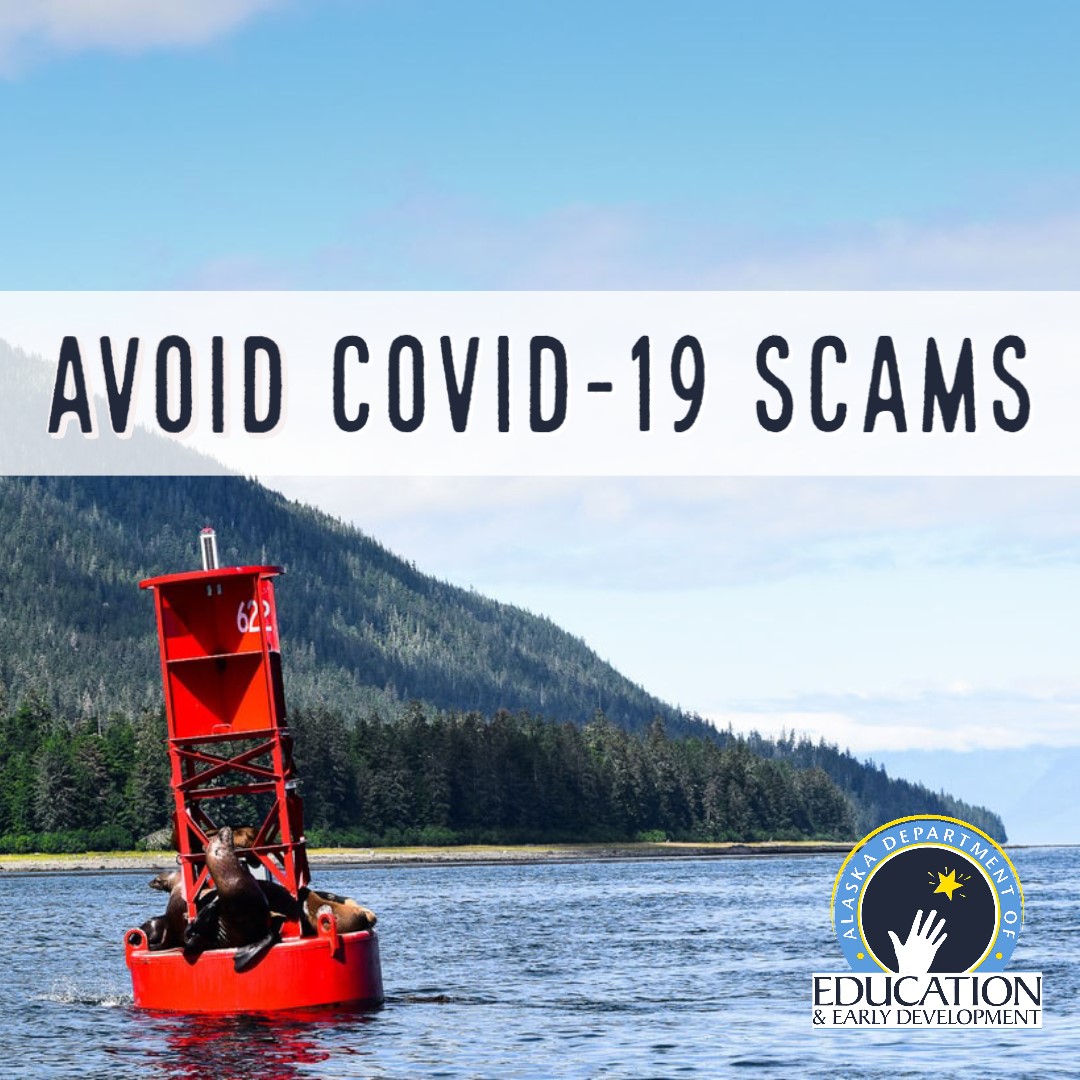- Cama-i, quyana tailuci!
- (Central Yup’ik)
- "Greetings, thank you for coming!"
Avoid COVID-19 Scams
Alaskans, along with the rest of the nation, are dealing with an unprecedented crisis. COVID-19 has produced new challenges and risks, many of which Alaskans have faced head-on with innovation and resiliency! Unfortunately, one of the risks incited by COVID-19 has been scammers. Scammers have been using this vulnerable time to take advantage of Alaskans.
Unfortunately, DEED has been made aware that a caller is targeting families about online courses and may be misrepresenting themselves as the Department of Education and Early Development. DEED would like to assure you that our staff is not making random calls to families to advertise online courses or any other resources. Additionally, the tools, resources, and courses offered by DEED are all available at no cost – so DEED would never be calling to request any payment information.
Alaska’s Attorney General Kevin Clarkson issued a press release to reminded Alaskans in late March to be vigilant in fending off potential scanners trying to take advantage of the COVID-19 situation. Included in the press release are a few tips for avoiding scams and avenues for reporting.
Here are a few more helpful tips from the Federal Trade Commission on how to avoid scams:
- Spot imposters. Scammers often pretend to be someone you trust, like a government official, a family member, a charity, or a company you do business with. Don’t send money or give out personal information in response to an unexpected request — whether it comes as a text, a phone call, or an email.
- Do online searches. Type a company or product name into your favorite search engine with words like “review,” “complaint” or “scam.” Or search for a phrase that describes your situation, like “IRS call.” You can even search for phone numbers to see if other people have reported them as scams.
- Don’t believe your caller ID. Technology makes it easy for scammers to fake caller ID information, so the name and number you see aren’t always real. If someone calls asking for money or personal information, hang up. If you think the caller might be telling the truth, call back to a number you know is genuine.
- Don’t pay upfront for a promise. Someone might ask you to pay in advance for things like debt relief, credit and loan offers, mortgage assistance, or a job. They might even say you’ve won a prize, but first you have to pay taxes or fees. If you do, they will probably take the money and disappear.
- Consider how you pay. Credit cards have significant fraud protection built in, but some payment methods don’t. Wiring money through services like Western Union or MoneyGram is risky because it’s nearly impossible to get your money back. That’s also true for reloadable cards (like MoneyPak or Reloadit) and gift cards (like iTunes or Google Play). Government offices and honest companies won’t require you to use these payment methods.
- Talk to someone. Before you give up your money or personal information, talk to someone you trust. Con artists want you to make decisions in a hurry. They might even threaten you. Slow down, check out the story, do an online search, consult an expert — or just tell a friend.
- Hang up on robocalls. If you answer the phone and hear a recorded sales pitch, hang up and report it to the FTC. These calls are illegal, and often the products are bogus. Don’t press 1 to speak to a person or to be taken off the list. That could lead to more calls.
- Be skeptical about free trial offers. Some companies use free trials to sign you up for products and bill you every month until you cancel. Before you agree to a free trial, research the company and read the cancellation policy. And always review your monthly statements for charges you don’t recognize.
- Don’t deposit a check and wire money back. By law, banks must make funds from deposited checks available within days, but uncovering a fake check can take weeks. If a check you deposit turns out to be a fake, you’re responsible for repaying the bank.
- Sign up for free scam alerts from the FTC at gov/scams. Get the latest tips and advice about scams sent right to your inbox.
Please know that the DEED team is ready and willing to answer any questions or concerns that you may have, or to help you find the tools or resources that you may need to assist you through this time of crisis; however, DEED will not be placing random calls to advertise any of our offerings. If you need to contact DEED, please call (907) 465-2800 or email eed.webmaster@alaska.gov.
Please stay vigilant and protect yourself against scammers during this challenging time. And know that your friends at DEED are here to help in any way that we are able! We are only a call or email away.

